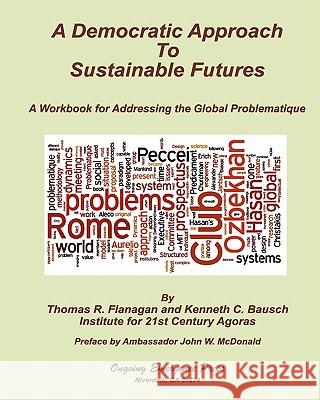A Democratic Approach to Sustainable Futures: A Workbook for Addressing the Global Problematique » książka
A Democratic Approach to Sustainable Futures: A Workbook for Addressing the Global Problematique
ISBN-13: 9780984526611 / Angielski / Miękka / 2011 / 174 str.
This workbook supports scholarly role playing in the arena of global diplomacy and human system planning. Audiences include students, faith-based groups, and community members who like to grapple with the big picture -- arguably the biggest picture -- of our times: global sustainability. The modular 4 or 5 week course can be extended as different groups might choose. Audiences will collaborate with others by authentically engaging the world's complexity through participatory democracy. This experiential learning opportunity has the power to change lives, and the promise to save the planet. The exploration begins with the challenges faced by the founders of the Club of Rome circa 1970. The founding prospectus identified the problematique underlying global sustainability as a set of 49 continuous critical problems. These interacting and entangled problems create what more recently has been called a wicked mess. They are not solvable in isolation because fixing one of them will likely further complicate others. Considering the full set of problems causes individuals to feel overwhelmed. For that reason, the structured dialogic design divides the challenge of understanding the problem up among members of the group, and then has them interact as a community of "experts" in their assigned problem areas. In a step wise process, this group of experts sequentially clarifies meanings, explores similarities among ideas, and identifies relationships between ideas. In this fashion, the group avoids becoming trapped in a reductionist approach to problem solving and enters into a communal understanding of the complex situation. Readers who wish to participate in an exploration of the problematique underlying global sustainability are invited to join a group through the Institute for 21st Century Agoras. In addition to the book itself, readers will be provided access to a software tool for tracking meanings that are uncovered, prompting decisions during deliberation, and then also presenting outcomes of those decisions as an easily read "tree." A Democratic Approach to Sustainable Futures builds capacities for understanding and resolving highly complex problems in collaboration. It is a "self help" workbook for communities sensing urgency for starting today to build their futures. The authors, Drs. Tom Flanagan and Ken Bausch, are systems scientists who each have over 20 years of experience in complex systems work. The inspiration for the workbook comes from their collaborative online teaching with Janet McIntyre and her students at Flinders University in Australia.











